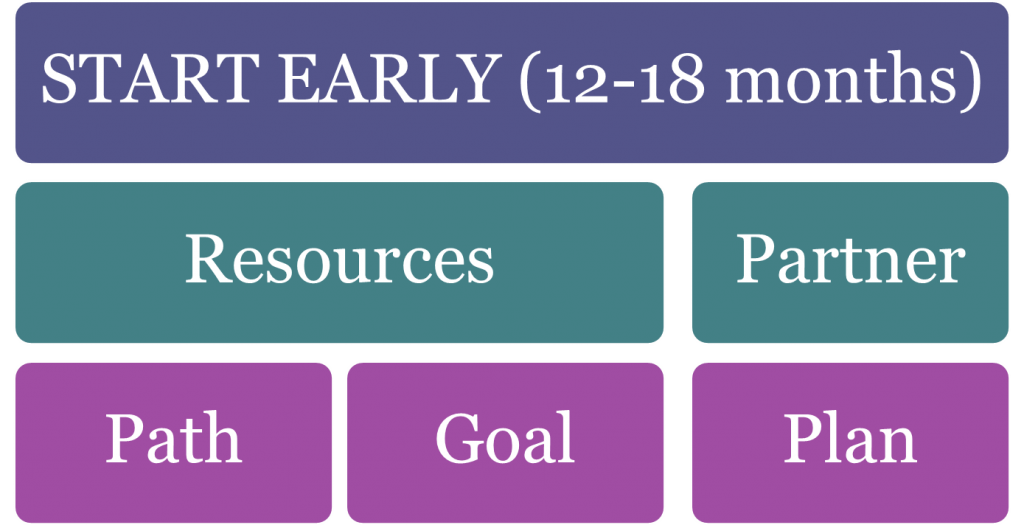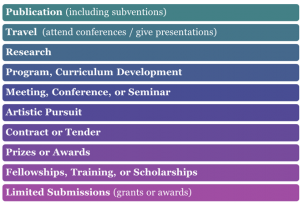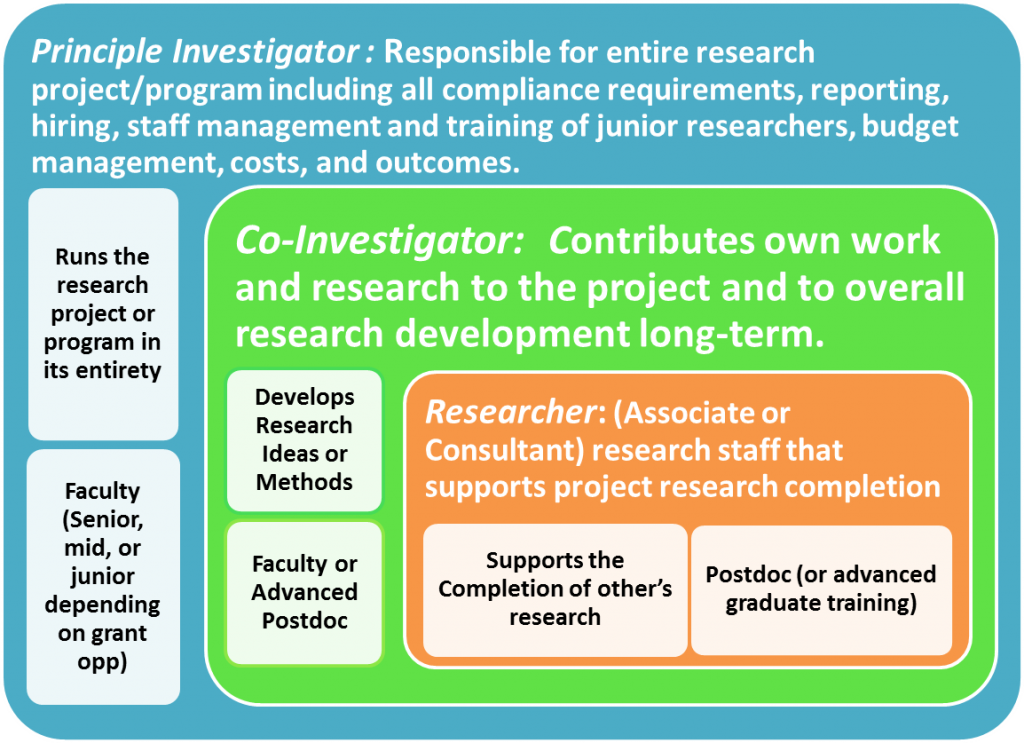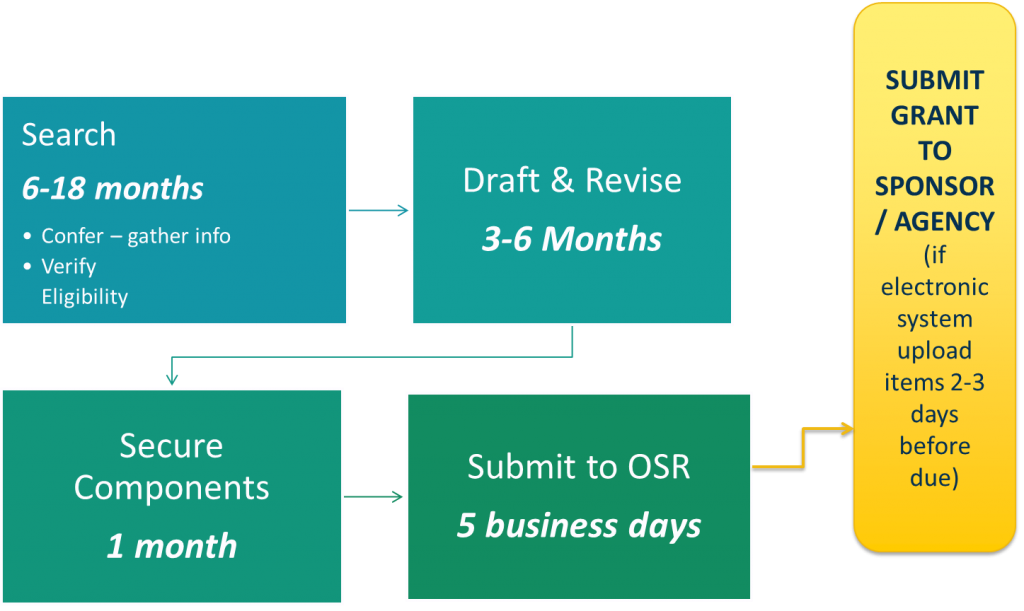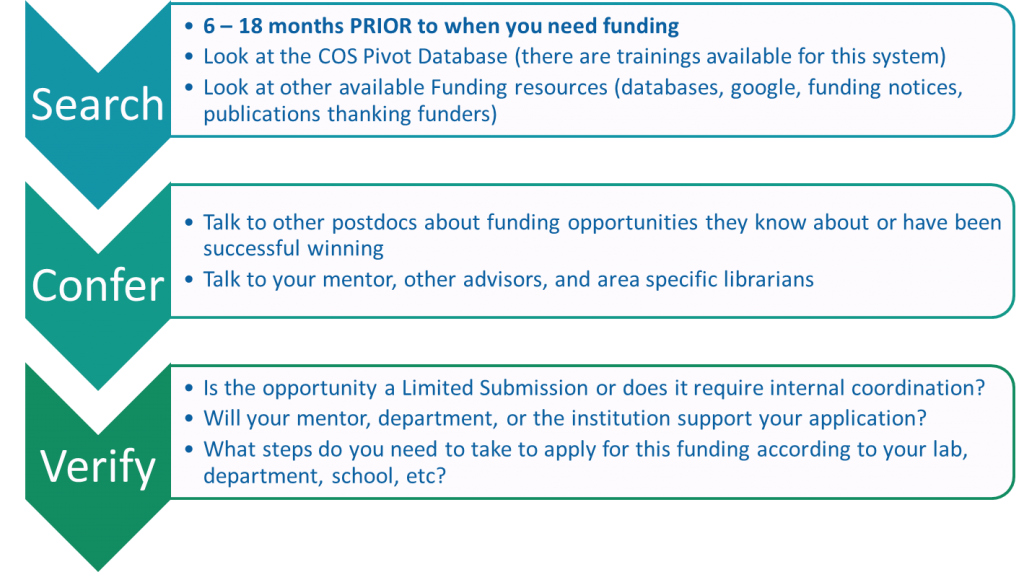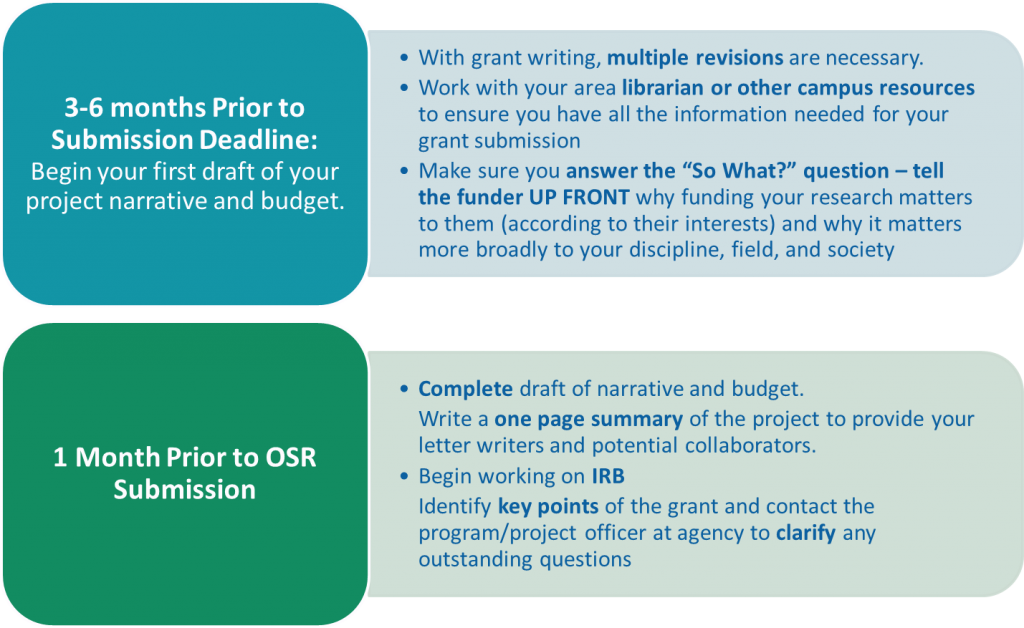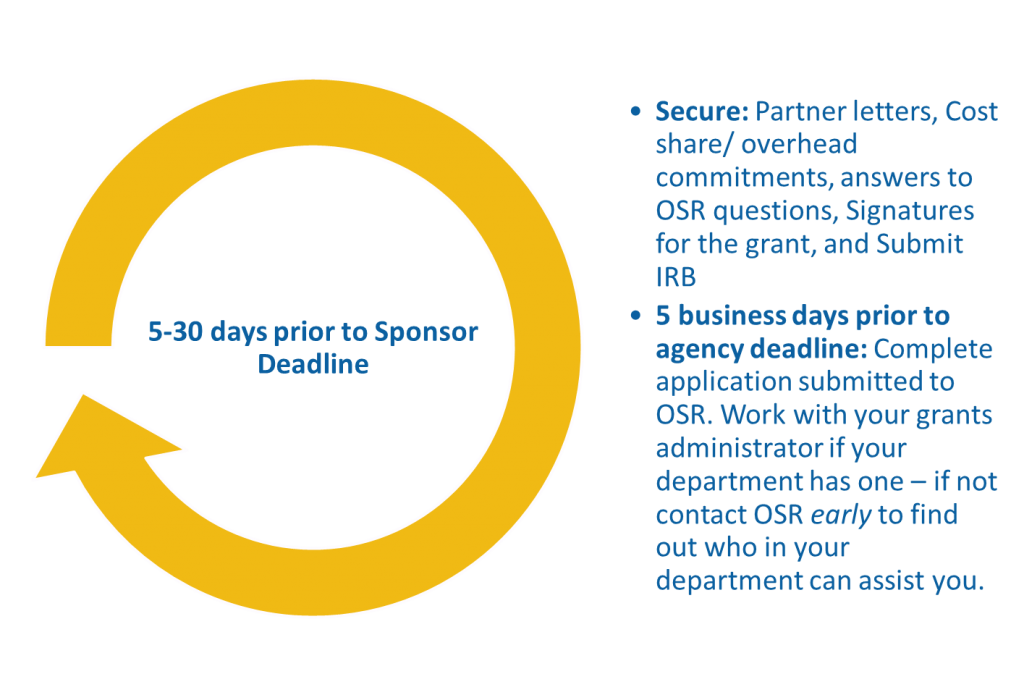If you attended any events please tell us about your experience:
Event Feedback
Funding Your Research and Scholarly Activities
Finding funding for academic research and scholarly work such as the funding increasingly necessary to support publishing and conference travel or research presentations can seem daunting no matter what stage of your career. Research and academic funding constitutes its own knowledge base that can seem opaque at first. Often the first time someone seeks funding it is because an immediate need for salary support or project funds has arisen or even because it is an aspect of their professionalization into their careers that has been deemed necessary by their mentor or chair. This situation can pose frustration and high levels of stress around academic funding because it can be very difficult with short notice (less than six months) to find any good matches for your specific funding needs. While it is not impossible to find funding in such short time frames, the process of finding a funding prospect, preparing an application, and submitting your application becomes increasingly compressed and complicated (for example: You are feverishly writing your grant application but your time frame gets unraveled because your most prestigious letter writer is on sabbatical, off campus, and you are having difficulty getting support letters required by your grant application).The good news is that a little bit of information can get you started on your way and you can learn everything you need to know to become an expert about how funding will work in your particular sphere. This page is intended to help get you started on learning about the basics of funding to assist in your search for support for your research projects. A basis tenet of research funding that is essential is that you should seek to fund the projects that INTEREST YOU and not try to build projects that seem to match funding trends. This is because being passionate about your project will help you write better applications to gain funding as well as to successfully complete the project once it is funded.For questions on grant submission basics, training availability, and other resources please see the links at the bottom of this page.
Funding Planning:
Most successfully funded projects often start as ideas and interests for researchers long before any funding search takes place. Even if the final application manipulates the research or ideas a slight amount to align the researcher’s interests with the funder’s requirements, understanding what you want to achieve with your research, why it matters to society, and how to frame that information for funders in advance means you will write better applications. Another benefit of long term planning for funding is that it can also help you with long term planning for publishing and other aspects of your academic career.
Funding generally works in specific cycles most of which are year long cycles – i.e. each year a sponsor (grant or award funding entity) puts out a ‘Call for Proposals’ (CFP) or ‘Request for Proposals’ (RFP) with a submission deadline for that yearly cycle. So what does “planning” mean? It can mean a variety of things depending on the project but a good thing to start with is taking the overview of your long term research goals, breaking them down into steps and pieces. Then see which pieces require or should be funded through extramural (outside) funding. Then you will get a feel for the types of funding you need, the time frames when you will need funding, any resources you might need access to in order to get funding, and whether or not you will need collaborators. Once you have this information, you can begin to make more concrete plans. Click the image above for a printable “Top Tips” document.
Click here for an excellent printable brochure on addressing sponsor questions about the impacts of your research from the National Alliance for Broader Impacts (although written for NSF requirements, the larger questions and advice are useful for ALL researchers).
Types of Available Funding (click here for a printable list with definitions of the categories below):
Each type of funding has its own generalized characteristics including rough maximum funding amounts as well as features expected in application packages or in the work done for the grant itself. Knowing what type of funding you will need both at specific points and regularly throughout the upcoming few years of your career (and maybe for your whole career) can assist you in developing the skills and gathering the resources to make grant writing for specific areas like publication or awards easier for yourself and eventually your research teams and students as well.
Resources and Support on Campus:
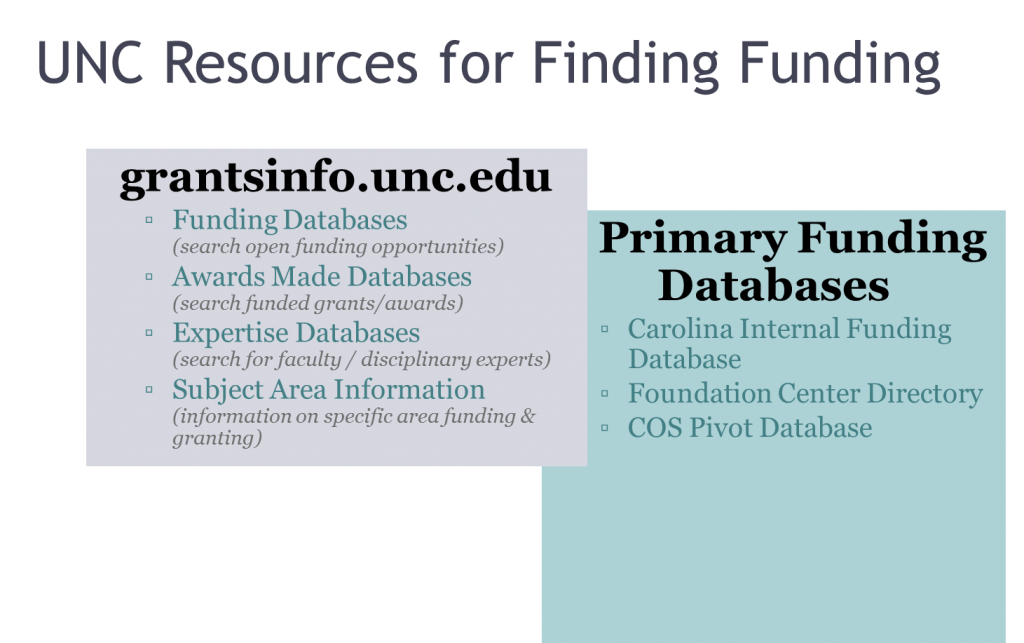
Some helpful resources are available on UNC’s Funding Info Portal for funding searches and learning more about funding opportunities on and off campus, as well as finding out what proposals have been successful in the past and locating possible collaborators.
There are also many campus offices in place that offer support and resources for graduate student research and finding funding as well as other aspects of your professionalization. This series of offices, The Graduate Funding Information Center (GFIC) in The Graduate School, The Center for Faculty Excellence (CFE), the University Libraries (UL), the Research Hub (HUB), and the NC TraCS Institute (TraCS) offer support in a range of areas that can assist you with finding funding, completing your research, publication, teaching, and various other aspects of your work and professionalization. For example, the University Libraries can assist with GIS and Data Services as well as helping researchers prepare bibliographies around their research topics. While, the NC TraCS Institute can assist researchers in all disciplines, especially those interested in collaboration and multi-/inter-/trans-disciplinary research to find funding, view successful proposals, and set up research collaborations.
Grant Search and Submission Timeline:
This is a general timeline to assist postdoctoral researchers with searching for, preparing and submitting sponsored research grants.
What is Sponsored Research?
Grants and Awards that require financial compliance reporting are considered “sponsored research” and must be reviewed, verified, and approved by the Office of Sponsored Research (OSR). These funds are typically paid to the recipient through the University.
What if I am applying for a fellowship or a grant that does not require such reporting?
If the grant/award you are preparing does not require review by OSR, this timeline can assist you with general thinking about successful search and application timelines. These grant / award funds are typically paid directly to the recipient.
How do I know if I should apply to a particular grant as a Principle Investigator (PI) or as a Co-Investigator (CoI)?
Below is a one page overview of what different roles are in grant / funding frameworks. These “grant roles” can help you to understand how you relate to a project in each area and what your participation on grants means in relationship to your workflow. A printable version of this framework is available here.
GRANT SUBMISSION TIMELINE OVERVIEW
Breaking It Down:
Submitting grants is a process that includes 1) Searching for funding, 2) Preparing your application package, and 3) Submitting your application. Below are quick charts that help define each step of the process. A full presentation of these materials is available here.
Searching for Funding
Preparing Your Application
Grant Submission
Research Development Plan “myRDP”
Thinking broadly about a research trajectory – what you want to do now and where it fits into a larger picture of your research and goals – is intrinsically important to being a successfully funded researcher and Principal Investigator. This is the goal of Research Development Planning. Some R1 Universities, like UNC-CH, have offices to support research development for faculty, however many other institutions do not offer these services. It can be highly useful to start thinking about your research in this way early in your career both to support your goals but also to assist you in discussing your research trajectory on the job market and with potential collaborators and mentors.This research development planning tool was created to work in coordination with Individual Development Plans (information below). The RDP form can be downloaded here.
Individual Development Plan “myIDP”
Feedback and constructive criticism are important for personal and professional growth. Individual Development Plans (“IDP”s) can be used to identify professional development needs and career objectives. IDPs also serve as a communication tool between an individual and their Mentor. You may utilize the online tool or a IDP form can be downloaded here.
The Funding Information Portal is a collection of databases and other resources selected to help UNC graduate students, faculty, and staff identify and apply for funding opportunities.
Carolina Internal Funding Database
The Carolina Internal Funding Database is a collection of internal UNC funding opportunities.
SPIN is a comprehensive database containing over 40,000 funding opportunities from more than 10,000 federal, public, non-profit, and private sponsors. Registered users can set up and save search preferences, sign up for email notifications, organize and export funding searches and funding opportunities. SPIN is available to all current UNC faculty, staff, visiting researchers, postdoctoral scholars, and students.
.
Institutional memberships – memberships that the University pays for on behalf of faculty, staff, and students – offer useful planning, training opportunities, and resources for all aspects of a professional academic career. They can help you develop your own research, teaching, and publication trajectories and provide useful options for completing mentoring, training, or other professional development plans used in applying for sponsored (particularly federal) funding.
DEVELOPING YOUR CAPACITY TO DO SPONSORED RESEARCH:
Presentation from January 23, 2019 Event
COLLABORATIVE, ENGAGED, & COMMUNITY-BASED RESEARCH:
Annotated Bibliography w/ Source Links Collaborative, Engaged, & Community-Based Research
“Grants for Grads” a resource on grant planning and seeking for graduate students from UT Austin
INNOVATION RESEARCH – Developing New Tools:
Gnovis Flowing Through the Galaxy of Knowledge (NEH Funded Project by Dr. Binotti- video – other projects funding through this program can be found here. More details at Humanities Commons on the project). Information on the process of getting to Gnovis: Launch Chapel Hill. Other connections to the project: Podcast Women in Tech NC, Digital Feminists project (video 1 / video 2).
DIGITAL HUMANITIES:
Check out some amazing things that can be done as digital humanities. Dr. Anderson’s website provides some wonderful tools, information, techniques on digital formats, processes, design and other aspects of digital humanities practice. The Carolina Digital Literacy Project is part of a campus-wide initiative to bring powerful digital tools to every student on campus (more info here). Carolina Digital Humanities is the home on campus for all things digital humanities and connects to the Digital Innovation Lab (DIL).
A trove of digital humanities information and tools has been put together by Dr. Crystal Felima
Here are the direct links:
On March 23, 2019, I had the privilege of giving the keynote address as the Stolzenberg-Doan Speaker for the inaugural Humanities Student Conference entitled ‘Crossroads of the Transatlantic.’
Check out the conference program here!
To complement my keynote and post-lunch lecture, here is a curated list for participants on digital humanities + pedagogy.
For a list of digital tools, check out a few lib guides from university libraries like the following:
Northwestern University: https://libguides.northwestern.edu/dh/tools
University of Tennessee: https://libguides.utk.edu/dh/tools
New York University: https://guides.nyu.edu/dighum/tools
A few readings on digital humanities and digital pedagogy:
-
Johanna Drucker, “Intro to Digital Humanities,” UCLA, http://dh101.humanities.ucla.edu/ INCLUDES TUTORIALS OF DIGITAL TOOLS
-
Ryan Cordell, “How Not to Teach the Digital Humanities,” 1 February 2015, http://ryancordell.org/teaching/how-not-to-teach-digital-humanities/
-
Julia Flanders, “The Productive Unease of 21st-century Scholarship,” Digital Humanities Quarterly3:3 (2009), http://www.digitalhumanities.org/dhq/vol/3/3/000055/000055.html.
-
Amy E. Earhart and Toniesha L. Taylor. “Pedagogies of Race: Digital Humanities in the Age of Ferguson.” Debates in the Digital Humanities 2016. Eds. Matthew K. Gold and Lauren F. Klein. Minneapolis, MN: University of Minnesota Press, 2016. 251-264: http://dhdebates.gc.cuny.edu/debates/text/72
-
Digital Pedagogy in the Humanities: Concepts, Models and Experiments, Modern Language Association (preprint 2016), https://digitalpedagogy.mla.hcommons.org
-
Brett D. Hirsch, ed. Digital Humanities Pedagogy: Practices, Principles and Politics. Open Book Publishers, 2012. http://www.openbookpublishers.com/product/161/digital-humanities-pedagogy–practices–principles-and-politics
-
Roopika Risam. “Navigating the Global Digital Humanities: Insights from Black Feminism.” Debates in the Digital Humanities 2016. Eds. Matthew K. Gold and Lauren F. Klein. Minneapolis, MN: University of Minnesota Press, 2016. 359-367: http://dhdebates.gc.cuny.edu/debates/text/80
-
The Journal of Interactive Technology & Pedagogy, https://jitp.commons.gc.cuny.edu/
-
Hybrid Pedagogy, http://www.digitalpedagogylab.com
-
Tooling Up for Digital Humanities: Pedagogy, Stanford University, http://toolingup.stanford.edu/?page_id=1211
-
Miriam Posner, “How’d They Make That?” 23 August 2013, http://miriamposner.com/blog/how-did-they-make-that/
-
Tooling Up for Digital Humanities: Pedagogy, Stanford University, http://toolingup.stanford.edu/?page_id=1211
-
Digital Pedagogy in the Humanities: Concepts, Models and Experiments, Modern Language Association (2016), https://digitalpedagogy.mla.hcommons.org
-
Johanna Drucker, “Intro to Digital Humanities,” UCLA, http://dh101.humanities.ucla.edu/
-
The Journal of Interactive Technology & Pedagogy, https://jitp.commons.gc.cuny.edu/
-
Hybrid Pedagogy, http://www.digitalpedagogylab.com/hybridped/
-
*Trevor Muñoz and Katie Rawson, “Against Cleaning,” Curating Menus, 6 July 2016, http://curatingmenus.org/articles/against-cleaning/
-
*Johanna Drucker, “Humanities Approaches to Graphical Display,” Digital Humanities Quarterly 5.1 (2011),http://www.digitalhumanities.org/dhq/vol/5/1/000091/000091.html
-
*Hadley Wickham, “Tidy Data,” Journal of Statistical Software 59 (2014), http://vita.had.co.nz/papers/tidy-data.pdf
-
Ed Summers, “On Forgetting and Hydration,” On Archivy, Nov. 18, 2014, https://medium.com/on-archivy/on-forgetting-e01a2b95272
-
Alex Gil and Élika Ortega. “Global Outlooks in Digital Humanities: Multilingual Practices and Minimal Computing.” Doing Digital Humanities. Eds. Richard Lane, Raymond Siemens, and Constance Crompton. London/NY: Routledge, 2016. 22-34.
-
Christof Schöch, “Big? Smart? Clean? Messy? Data in the Humanities,” Journal of Digital Humanities 2:3 (2013), http://journalofdigitalhumanities.org/2-3/big-smart-clean-messy-data-in-the-humanities/
-
*Lisa Gitelman, “Introduction,” Raw Data Is an Oxymoron ed. Gitelman (MIT Press 2013), pdf: RawData.
-
Thomas Padilla and David Higgins, “Library Collections as Humanities Data: The Facet Effect,” Public Services Quarterly 10:4 (2014), http://thomaspadilla.org/papers/padillahiggins_humdata_postprint.pdf(doi:10.1080/15228959.2014.963780)
-
P. Gabrielle Foreman and Labanya Mookerjee, “Computing in the Dark: Spreadsheets, Data Collection, and DH’s Racist Inheritance” in “Collections as Data Position Papers,” https://collectionsasdata.github.io/aac_positionstatements.pdf
-
Leah Rosenberg. “Refashioning Caribbean Literary Pedagogy in the Digital Age.” Caribbean Quarterly (62:3-4), 2016, http://www.tandfonline.com/doi/abs/10.1080/00086495.2016.1260282
-
Ted Underwood, “Seven ways humanists are using computers to understand text,” Jun. 4, 2015, https://tedunderwood.com/2015/06/04/seven-ways-humanists-are-using-computers-to-understand-text/
-
Trevor Owens, “Discovery and Justification are Different: Notes on Science-ing the Humanities,” Nov. 19, 2012, http://www.trevorowens.org/2012/11/discovery-and-justification-are-different-notes-on-sciencing-the-humanities/
-
Ted Underwood, “Topic modeling made just simple enough,” Apr. 7, 2012, https://tedunderwood.com/2012/04/07/topic-modeling-made-just-simple-enough/
-
Elijah Meeks and Maya Krishnan, “Introduction to Network Analysis and Representation,” http://dhs.stanford.edu/dh/networks/
-
Also of interest: Claire Lemercier, “Formal Network Methods in History: Why and How?,” Social Networks, Political Institutions, and Rural Societies (Brepols, 2015), https://halshs.archives-ouvertes.fr/halshs-00521527v2/document
-
Lisa Spiro, “‘This Is Why We Fight’: Defining the Values of the Digital Humanities,”Debates in Digital Humanities (2012), http://dhdebates.gc.cuny.edu/debates/text/13
-
Alan Liu, “DH Toychest,” http://dhresourcesforprojectbuilding.pbworks.com/w/page/69244243/FrontPag
-
*Haley Di Pressi, Stephanie Gorman, et al., “A Student Collaborator’s Bill of Rights,” UCLA Digital Humanities,http://www.cdh.ucla.edu/news-events/a-student-collaborators-bill-of-rights/
-
*Digital Safety for Open Researchers, https://github.com/opendigitalsafety/Digital-Safety-for-Open-Researchers OR https://digital-safety-for-open-research.gitbook.io/project/
-
“Fair Use Fundamentals,” http://fairuseweek.org/wp-content/uploads/2015/02/ARL-FUW-Infographic-r4.pdf
-
Bethany Nowviskie, “Evaluating Collaborative Digital Scholarship (or, Where Credit Is Due),” Journal of Digital Humanities 1:4 (Fall 2012), http://journalofdigitalhumanities.org/1-4/evaluating-collaborative-digital-scholarship-by-bethany-nowviskie/
-
Also of interest: project charters from the Scholars’ Lab, http://praxis.scholarslab.org/charter/
Free Tools for Students and Faculty
DIGITAL PUBLISHING
Omeka (omeka.org) allows for the creation and sharing of scholarly collections or exhibits.
WordPress (https://wordpress.com/) a popular, open-source blogging platform. Can be used for websites.
Storymaps (https://storymaps.arcgis.com/en/)combine your maps with narrative text, images, and multimedia content.
Scaler (scalar.usc.edu) supports the creation of long-form, born-digital online scholarship using a variety of media.
TIMELINE TOOLS
Chronos Timeline (hyperstudio.mit.edu/software/chronos-timeline) “dynamically presents historical data in a flexible online environment. Switching easily between vertical and horizontal orientations, researchers can quickly scan large numbers of events, highlight and filter events based on subject matter or tags, and recontextualize historical data.”
QGIS (qgis.org/en) is “the best GIS tool in the free and open-source software (FOSS) community.”
TimelineJS (timeline.knightlab.com) “is an open-source tool that enables anyone to build visually rich, interactive timelines. Beginners can create a timeline using nothing more than a Google spreadsheet.”
DATA VISUALIZATION
Concordle (folk.uib.no/nfylk/concordle) and Wordle (wordle.net): creates word clouds that are interactive.
Netlytic (netlytic.org) is a text and social network analyzer that summarizes and discovers social networks that are apparent from online conversations on social media sites.
Palladio (hdlab.stanford.edu/palladio) visualizes historical data.
Prism (prism.scholarslab.org/users/sign_in) is a tool for crowdsourcing the interpretation of any type of textual materials.
Sophie (sophie2.org/trac) allows users to combine text, images, video, and sound.
Tableau (tableau.com) is a free data visualization software.
Voyant Tools (voyant-tools.org) is a web-based reading and analysis environment for any digital text.
PUBLIC HUMANITIES
Carolina Public Humanities offers programming and events that help connect the public with humanities research. Check their site for the events calendar and more information. CPH also offers Public Humanities Fellowships for graduate students – more info here. CPH also runs an initiative “Humanities for the Public Good” which includes programming, faculty support, and graduate fellowships – partnered with the IAH and generously funded by the Mellon Foundation.
56 Ways to do the Public Humanities (NEH)
The case for creativity and creative spaces in libraries – Library Connect
THE PURPOSE & BENEFITS OF DOING A POSTDOC

